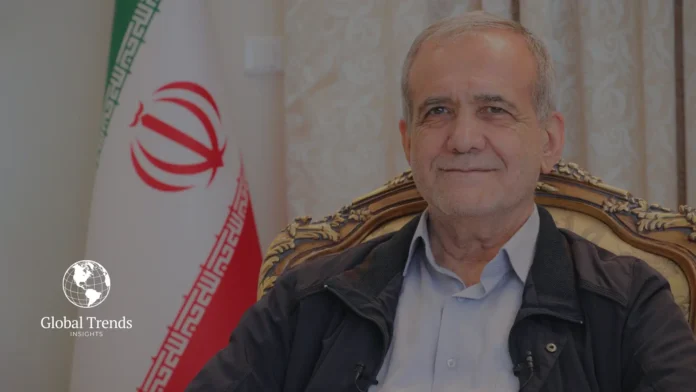Iran-Israel ceasefire: Iran has hinted at adjusting its response to Israeli attacks if a ceasefire is implemented, the Iranian president stated on Sunday. President Masoud Pezeshkian suggested that a truce could influence Tehran’s reaction to recent airstrikes on Iranian military sites.
“If Israel reconsiders its actions and agrees to a ceasefire, stopping its attacks on innocent individuals in the region, it could alter our response,” Pezeshkian stated. He emphasized Iran’s commitment to defending its sovereignty and responding to any perceived aggression.
The recent escalation followed Israeli airstrikes on October 26, which were said to be a reaction to Iran’s missile attack on October 1. According to Israeli officials, these strikes were necessary to counter threats posed by Iranian military activities. Iran, however, framed the assault as retaliation for the recent killing of key militant leaders linked to its allies, as well as a Revolutionary Guards commander.
Also Read: China Condemns Sovereignty Violations Amid Rising Middle East Tensions
Warnings and Reactions from Tehran and Tel Aviv
Following the airstrikes, Israeli Prime Minister Benjamin Netanyahu claimed that the operation aimed at Iran’s defense capabilities and missile production infrastructure. Iranian media reported that four military personnel and a civilian died in the attack, with “limited damage” sustained to radar systems.
Iran’s supreme leader, Ayatollah Ali Khamenei, underscored Iran’s readiness to respond to actions taken against its allies and itself. He cautioned Israel, along with its allies, including the U.S., that provocations against Iran and its “resistance front” could provoke a significant counterattack.
The term “resistance front” refers to a coalition of armed groups that Tehran supports, including Yemen’s Huthi rebels, Lebanon’s Hezbollah, and Hamas in Palestine. These groups play a strategic role in Iran’s regional influence, raising the stakes of any military engagement.
Potential for De-escalation Hinges on Ceasefire Talks
The call for a ceasefire comes amid international discussions about curbing hostilities between Iran and Israel. Some analysts suggest that a formal truce could provide a pathway for dialogue and prevent further escalation.
Conclusion
The unfolding scenario underscores the deep-seated geopolitical tensions in the Middle East. While Israel seeks to curb Iran’s military capabilities, Tehran remains firm in defending its influence and alliances. A ceasefire could provide a critical moment for diplomacy, though it remains unclear whether both sides will pursue this path. The future of regional stability may hinge on the willingness of Iran and Israel to engage in de-escalatory measures.
